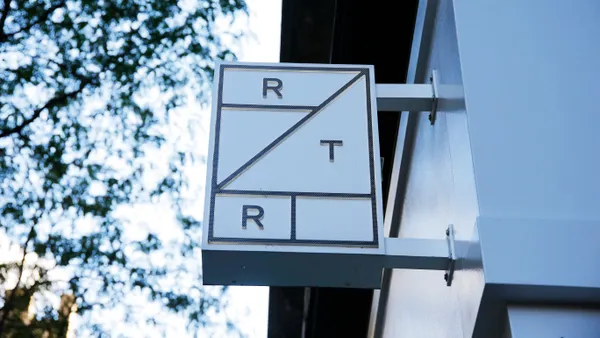Dive Brief:
- Farfetch and some of its top executives are facing a class-action complaint from a group of shareholders that alleges the luxury e-commerce company violated federal securities laws, according to court documents.
- The complaint alleges that Farfetch failed to disclose that it was experiencing a “significant slowdown” of growth in the U.S. and China, which the complaint says are the company’s largest markets. It also claims Farfetch didn’t disclose that it was facing onboarding challenges for its Reebok partnership with Authentic Brands Group, a deal in which Farfetch operates the Reebok e-commerce and wholesale businesses in Europe.
- The complaint, filed in October, serves as a backdrop for rumors that Farfetch is planning to delist from the New York Stock Exchange. On Nov. 28, the Telegraph reported that Farfetch CEO José Neves was considering the move. Last week, the company canceled its third quarter earnings announcement and said it would “not be providing any forecasts or guidance at this time, and any prior forecasts of guidance should no longer be relied upon.”
Dive Insight:
Along with the company itself, Neves, CFO Elliot Jordan and Group President Stephanie Phair are each named as defendants in the case, filed in the U.S. District Court for the District of Maryland. Attorneys for the plaintiffs argue that these executives had power and authority to control the contents of Farfetch’s SEC filings, press releases and other communications.
The group of plaintiffs purchased or acquired Farfetch securities between March 9 and Aug. 17. Attorneys for the plaintiffs argue that during that time, Farfetch made “materially false and misleading statements regarding the Company’s business, operations, and prospects.”
The complaint also argues that Farfetch overstated its ability to manage its supply chain and inventory. It said this, along with the previously mentioned claims, had a significant negative impact on the company’s revenue, making Farfetch unlikely to meet market expectations for its second quarter of 2023. In the second quarter, Farfetch’s revenue decreased 1.3% to $572.1 million. The complaint states this is less than the market consensus of $650.71 million.
Farfetch attributed the decline to brand platform revenue falling 42.2% and in-store revenue falling 15.1%.
Following these results, the complaint states that Farfetch’s Class A ordinary share price fell about 45.17% to close at $2.61 a share. Subsequently, the complaint states, company shareholders suffered loss and damages due to Farfetch’s alleged omissions.
A representative for Farfetch didn’t immediately respond to Fashion Dive’s request for comment.
The Nov. 28 article from the Telegraph that claimed Neves was looking to take the company private said Farfetch was considering a deal with the “tentative backing” partners such as Alibaba and Richemont.
In October, Farfetch and Richemont were granted antitrust clearance to proceed with the previously announced deal that gave Farfetch a 47.5% stake in Richemont’s digital Yoox Net-a-Porter platform, which consists of Net-a-Porter, Mr Porter, The Outnet and Yoox.
Following the Telegraph report, however, Richemont said it was “carefully monitoring the situation, including reviewing its options in respect of its arrangements with FARFETCH announced on 24 August 2022, which remain subject to certain terms and outstanding conditions,” Fashion Dive previously reported. Richemont similarly said it was under no financial obligation to Farfetch and “does not envisage lending or investing into FARFETCH.”











